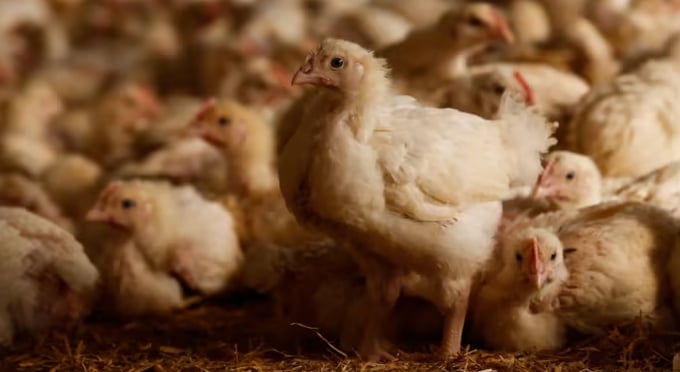June 19, 2025 | 03:49 GMT +7
June 19, 2025 | 03:49 GMT +7
Hotline: 0913.378.918
June 19, 2025 | 03:49 GMT +7
Hotline: 0913.378.918

Supermarkets have largely blamed the egg shortages on the avian flu outbreak, but farmers have been struggling with the high costs of energy and feed for months.
Remember lockdowns? When a highly infectious virus forced us indoors for months on end? Spare a thought — as you devour your scrambled eggs this weekend — for the chickens of England, cooped up and locked down by order of Defra, the poultry sector’s answer to Chris Whitty.
The environment and farming department imposed mandatory housing for all poultry and domesticated birds in England earlier this month to limit the worst outbreak of avian flu on record. The rampant epidemic has led to the death — mainly through culling — of 97mn birds globally, and 3.8mn in the UK, according to the World Organisation for Animal Health.
While some consumers have been swift to fret about what to serve instead of turkey this Christmas, the real debate this week has been the threat to our morning omelettes. This is perhaps unsurprising for a nation proud to go to work on an egg and now grappling with bigger questions about the future of free-range.
According to industry standards, for eggs to be categorised as free-range they must be laid by hens with continuous access to a chicken run and a cosy 15cm of perch of their own in a henhouse. In the case of a lockdown, birds with no access to the outdoors are still technically free-range for up to 16 weeks.
Daniel Crossley, of the Food Ethics Council, says the four-month allowance helps to avoid consumer confusion about the free-range label. “If we’re confident this is a one off, then it feels sensible to have that grace period,” he said. The difficulty comes when avian flu persists as it has done this year, rather than petering out during the summer months.
After four months, producers are required to label their products as “barn eggs”. Similar rules apply to other poultry products. OXO this week labelled batches of its free-range chicken stock, “temporarily made using non free-range stock”.
More noticeable than rogue labels were the dramatic egg shortages that hit supermarkets this week. Shoppers gaped at empty shelves while Twitter filled with helpful ideas for baking substitutes, and disconcerting methods for long-term egg storage (pickling lime, anyone?).
Branches of Asda limited customers to two boxes of eggs each, with a limit of three at Lidl, while Sainsbury’s caused consternation by importing Italian eggs. JD Wetherspoons took eggs off the menu on some breakfast options altogether, generously swapping in hash browns, onion rings or extra sausages.
Supermarkets have largely blamed all this on the avian flu outbreak, but angry chicken farmers have been quick to correct them. The industry has been struggling with rocketing energy and feed costs for months, and rising input costs including labour and packaging. Though supermarkets have raised their egg prices by approximately 45p since March, only 5-10p of this has been passed on.
The British Free Range Egg Producers Association said a third of its hen farmers had either reduced their flock sizes, paused production or left the industry altogether as a result of the cost pressures. “Failing to break even when you’re trying to look after livestock is a very depressing experience,” said Robert Gooch, the association’s chief executive.
The EU, meanwhile, is looking to scrap the 16-week limit, allowing farmers to categorise products as free-range indefinitely while avian flu persists. Gooch hopes the UK will follow suit.
Supermarkets will have to cough up to avoid further shortages, and eggs will be plentiful again — no doubt in time for the dreaded eggnog season. But the cost of living crisis isn’t a reason to neglect the UK’s essential food producers, just as avian flu is no justification for sacrificing animal welfare. For now, chickens will remain in lockdown. And consumers might start to ask more questions about where their eggs come from than how to hoard them.
(Finacial Times)

(VAN) Extensive licensing requirements raise concerns about intellectual property theft.

(VAN) As of Friday, a salmonella outbreak linked to a California egg producer had sickened at least 79 people. Of the infected people, 21 hospitalizations were reported, U.S. health officials said.

(VAN) With the war ongoing, many Ukrainian farmers and rural farming families face limited access to their land due to mines and lack the financial resources to purchase needed agricultural inputs.

(VAN) Vikas Rambal has quietly built a $5 billion business empire in manufacturing, property and solar, and catapulted onto the Rich List.

(VAN) Available cropland now at less than five percent, according to latest geospatial assessment from FAO and UNOSAT.

(VAN) Alt Carbon has raised $12 million in a seed round as it plans to scale its carbon dioxide removal work in the South Asian nation.

(VAN) Attempts to bring down the price of the Japanese staple have had little effect amid a cost-of-living crisis.